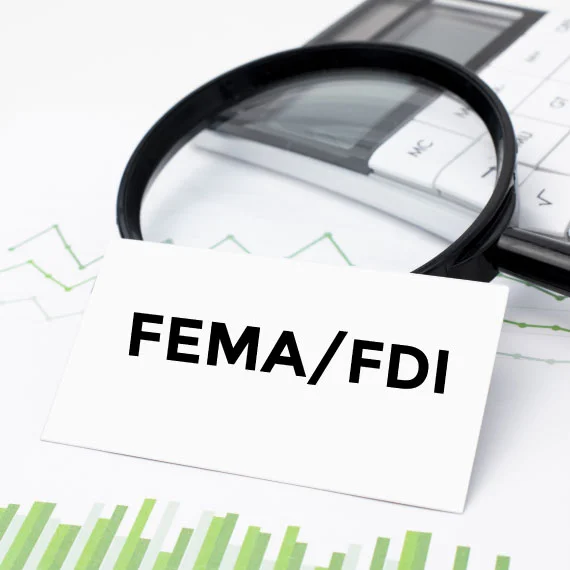What is FDI and Why Does It Matter?
Foreign Direct Investment (FDI) occurs when individuals or companies from one country invest money in businesses located in another. In India, FDI is a vital source of capital that facilitates business expansion and job creation. The primary legislation governing this is the FEMA Act.
Who Makes the Rules for FDI in India?
The main law governing FDI in India is the Foreign Exchange Management Act, 1999 (FEMA Act). This crucial legislation is overseen by:
- Reserve Bank of India (RBI): India’s central bank
- Department for Promotion of Industry and Internal Trade (DPIIT): A government department
- Ministry of Finance: Handles financial policies

How Can Foreign Investors Invest in India?
Foreign investors can invest in India through two primary routes:
- Automatic Route: No prior government approval is necessary. Investors simply need to notify the RBI after the investment is made. This route is available for the majority of business sectors.
- Government Approval Route: Prior approval from the relevant authorities is required before making the investment. This is necessary for sensitive sectors or when the investment exceeds certain stipulated limits.
Which Business Sectors Allow FDI?
India categorizes business sectors based on the permissibility of foreign investment:
- Prohibited Sectors: Foreign investment is not allowed in these sectors. Examples include the lottery business, gambling, and atomic energy.
- Restricted Sectors: Foreign investment is permitted in these sectors but is subject to specific limits. Examples include defense (up to 74% without approval, more with government permission), insurance (up to 74% without approval), banking (up to 74% without approval), and media and broadcasting (limits vary from 26% to 100%).
- Fully Open Sectors: 100% foreign investment is allowed in these sectors. This includes manufacturing, most services, pharmaceuticals (new projects), and construction, among others.
What Steps Must Investors Follow?
Before Investing:
- Verify if the specific business sector permits FDI and understand the applicable investment limits.
- Obtain a professional valuation of the Indian company, as mandated by law.
- Ensure all company documents are in compliance with Indian regulations.
During Investment:
- Transfer investment funds through authorized banking channels.
- File Form FC-GPR within 30 days of issuing shares to the foreign investor.
- Ensure all reporting is completed on the FIRMS online platform, which is the RBI’s dedicated system.
After Investment:
- File an Annual Return on Foreign Liabilities and Assets (FLA) by July 15th each year.
- Report any changes in the investment structure promptly.
- Adhere to specific regulations concerning the repatriation of profits to the investor’s home country.
What Happens If Rules Are Not Followed?
Common Violations:
- Failure to report investments within the stipulated timelines.
- Investing in sectors that are prohibited or exceeding the permissible investment limits.
- Delay in issuing shares beyond 60 days from the receipt of foreign funds.
- Non-adherence to prescribed valuation methodologies.
- Failure to file the mandatory annual returns.
Penalties:
- Financial Penalties: These can be up to three times the amount involved in the contravention. In cases where the amount is not quantifiable, the penalty can be up to ₹2 lakhs (₹200,000), with an additional penalty of up to ₹5,000 per day for continuing violations.
- Compounding (Settlement) Process: This allows for voluntary disclosure and payment of a penalty to avoid formal legal proceedings. The penalty amount is determined based on the nature and severity of the violation. Typically, late reporting attracts lesser penalties compared to more serious breaches.

How to Avoid Problems?
- Conduct Thorough Due Diligence: Always check the latest FDI rules applicable to your specific business sector. It is advisable to Contact Chartered Accountant professionals for expert guidance. Understand all reporting obligations before making any investment.
- Maintain Meticulous Records: Ensure all documents related to the investment are properly maintained. Keep comprehensive records of all foreign fund transfers and meticulously document all approvals and permissions obtained.
- Adhere to All Deadlines: File all necessary forms within the specified timeframes. Submit annual returns punctually and report any changes in the investment structure without delay.
- Address Mistakes Promptly: If any non-compliance is identified, disclose it voluntarily at the earliest. Apply for the compounding (settlement) process with the RBI and take immediate steps to rectify the issue and prevent its recurrence.
Recent Changes to Know About
- Streamlined online reporting processes through the FIRMS platform.
- Implementation of stricter regulations for investments originating from countries sharing a land border with India.
- Expansion of sectors now permitting 100% FDI under the automatic route.
Getting Help
For those planning to invest in India or receive foreign investment, seeking professional assistance is highly recommended. Consider working with:
- A chartered accountant who possesses specialized expertise in FEMA Act regulations.
- An authorized bank that is experienced in handling foreign exchange transactions.
- Legal advisors who have a proven track record in foreign investment matters.
This collaborative approach will significantly enhance your ability to comply with all relevant regulations and mitigate the risk of incurring costly penalties. JD Shah Associates, a Best CA firm in Borivali, offers expert guidance in this domain.

Ensuring Smooth FDI Compliance with Expert Guidance

Navigating the landscape of Foreign Direct Investment (FDI) in India, governed by the FEMA Act, necessitates a comprehensive understanding of the rules, regulations, and reporting requirements. From determining the appropriate investment route and adhering to sector-specific guidelines to ensuring timely filings and avoiding penalties, the process can be complex. Seeking expert advice on FEMA Valuation is paramount to ensure compliance and facilitate a seamless investment experience.
To navigate these complexities effectively and ensure adherence to all applicable regulations, contact Chartered Accountant professionals at JD Shah Associates, your trusted Best CA firm in Borivali, for comprehensive support and guidance.
![]()




